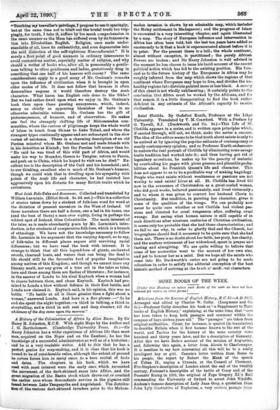A History of the Colonisation of Africa by Alien Races.
By Sir Harry H. Johnston, K.C.B. With eight Maps by the Author and J. G. Bartholomew. (Cambridge University Press. 6s.)—Sir Harry Johnston has a wider experience of African life than most men, acquired on the Niger and on the Zambesi; he has the knowledge of a successful administrator as well as of a historian ; and he is a very readable writer. Add to this that he has a perfect genius for map-making, and it is clear that his book is bound to be of considerable value, although the extent of ground he covers forces him in many cases to a bare recital of facts and dates. The chapters in his book which we have read with most interest were the early ones which recounted the movement...of the dark.skinned races into Africa,. and the great migration of the Bantu stock which drove out or overlaid the earlier race whose descendants survive in the pigmies still found between Lake Tanganyika and Angolaland. The distribu- tion of the various dark-skinned invaders prior to the Mahom- medan invasion is shown by an admirable map, which includes the Malay settlement in Madagascar; and the progress of Islam is recounted in a very interesting chapter, and again illustrated by a map. The story of European influence and intervention in Africa has often been told, but the last ten years have added so enormously to it that a book 19 superannuated almost before it is in print. For the present there is a lull ; the whole continent, almost without exception, is partitioned ; the purely African Powers are broken ; and Sir Harry Johnston is well advised in the moment he has chosen to issue his lucid account of the recent political action which has led to the existing position. His fore- cast as to the future history of the Europeans in Africa may be roughly inferred from the map which shows the regions of that continent where Europeans may hope to live, and divides the un- healthy regions into districts painted more or less black. A survey of this chart is not wholly exhilarating; it certainly points to the conclusion that Africa must be worked by the Africans, and fos that reason it is a little disappointing to find the book rather deficient in any estimate of the African's capacity to receive civilisation.






































 Previous page
Previous page